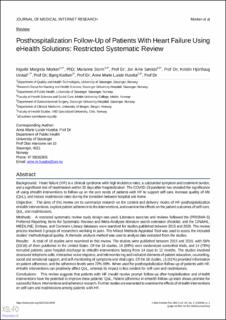Posthospitalization follow-up of patients with heart failure using eHealth solutions : restricted systematic review
Morken, Ingvild Margreta; Storm, Marianne; Søreide, Jon Arne; Urstad, Kristin Hjorthaug; Karlsen, Bjørg; Husebø, Anne Marie Lunde
Peer reviewed, Journal article
Published version

Åpne
Permanent lenke
https://hdl.handle.net/11250/3039114Utgivelsesdato
2022Metadata
Vis full innførselSamlinger
- Artikler [412]
- Publikasjoner fra Cristin [429]
Sammendrag
Background: Heart failure (HF) is a clinical syndrome with high incidence rates, a substantial symptom and treatment burden, and a significant risk of readmission within 30 days after hospitalization. The COVID-19 pandemic has revealed the significance of using eHealth interventions to follow up on the care needs of patients with HF to support self-care, increase quality of life (QoL), and reduce readmission rates during the transition between hospital and home. Objective: The aims of this review are to summarize research on the content and delivery modes of HF posthospitalization eHealth interventions, explore patient adherence to the interventions, and examine the effects on the patient outcomes of self-care, QoL, and readmissions. Methods: A restricted systematic review study design was used. Literature searches and reviews followed the (PRISMA-S) Preferred Reporting Items for Systematic Reviews and Meta-Analyses literature search extension checklist, and the CINAHL, MEDLINE, Embase, and Cochrane Library databases were searched for studies published between 2015 and 2020. The review process involved 3 groups of researchers working in pairs. The Mixed Methods Appraisal Tool was used to assess the included studies’ methodological quality. A thematic analysis method was used to analyze data extracted from the studies. Results: A total of 18 studies were examined in this review. The studies were published between 2015 and 2019, with 56% (10/18) of them published in the United States. Of the 18 studies, 16 (89%) were randomized controlled trials, and 14 (78%) recruited patients upon hospital discharge to eHealth interventions lasting from 14 days to 12 months. The studies involved structured telephone calls, interactive voice response, and telemonitoring and included elements of patient education, counseling, social and emotional support, and self-monitoring of symptoms and vital signs. Of the 18 studies, 11 (61%) provided information on patient adherence, and the adherence levels were 72%-99%. When used for posthospitalization follow-up of patients with HF, eHealth interventions can positively affect QoL, whereas its impact is less evident for self-care and readmissions. Conclusions: This review suggests that patients with HF should receive prompt follow-up after hospitalization and eHealth interventions have the potential to improve these patients’ QoL. Patient adherence in eHealth follow-up trials shows promise for successful future interventions and adherence research. Further studies are warranted to examine the effects of eHealth interventions on self-care and readmissions among patients with HF. Keywords: adherence; eHealth; heart failure; posthospitalization follow-up; patient outcome; review.
